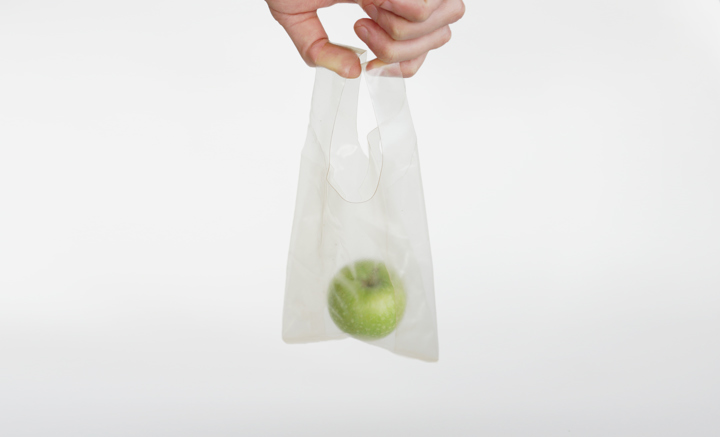This year’s UK national James Dyson Award winner, 23-year-old Lucy Hughes from the University of Sussex, attempts to solve the problem of both single-use plastics and inefficient waste streams by harnessing fish offcuts to create a unique plastic alternative, MarinaTex.
MarinaTex is a bioplastic made of organic fish waste ordinarily destined for landfill or incineration and locally sourced red algae. It is a translucent and flexible sheet material, making it ideal for applications in single-use packaging. While it may look and feel like plastic, its similarities end there. In fact, it is stronger, safer and much more sustainable than its oil-based counterpart. Using a unique formula of red algae to bind the proteins extracted from fish waste, MarinaTex has strong overlapping bonds giving it strength and flexibility. The material is relatively resource-light, requiring little energy and temperatures under 100 degrees to produce. It biodegrades after four to six weeks, is suitable for home composting and does not leach toxins, removing the need for its own national waste management infrastructure. As MarinaTex uses byproducts from the fishing industry, this helps to close the loop of an existing waste stream for a more circular product lifespan. According to Lucy, one Atlantic cod could generate as much organic waste as is needed for making 1,400 bags of MarinaTex.
The Invention
Unwanted offcuts from the fish processing industry is a huge waste stream in the UK. It’s comprised of offal, blood, crustacean and shellfish exoskeletons and fish skins and scales – the bits that end up in landfill rather than on our plates. Through extensive research, she found that the fish skins and scales were the most promising sources, due to their flexibility and strength enabling proteins.
In order to give these proteins something to attach to and create a brand new material, Lucy set about finding an organic binder. Keen to keep the solution local in order to reduce transportation, she looked to the Sussex coastline on her doorstep, experimenting with different organic marine binders but finally settling on agar. It took over 100 different experiments to refine the material and process, most of which she did on the kitchen stove of her student accommodation. She finally created a consistent and plastic-like material that was both biodegradable and translucent, MarinaTex.
Lucy says: “Plastic is an amazing material but we’re too reliant on it as designers and engineers. It makes no sense to me that we’re using plastic, an incredibly durable material, for products that have a life-cycle of less than a day. For me, MarinaTex represents a real commitment to innovating plastic use and incorporating sustainable, local and circular values into product design. As engineers, we shouldn’t limit ourselves to designing to form and function, but rather form, function and footprint.”
As national winner of the James Dyson Award, Lucy will receive £2,000 as well as moving on to the international round of the competition, for a chance to win £30,000. Lucy aims to commercialise her invention sustainably, using her award money for further research into how MarinaTex can become a global answer to the abundance of plastic waste while still harnessing local solutions.
The Runners Up
Afflo, Anna Bernbaum, Dyson School of Dyson Engineering, Imperial College London
Problem: Asthma is a condition that makes breathing difficult in response to external triggers. Matching triggers to individuals’ symptoms is problematic, currently done by trial and error. On average, three people die from an asthma attack in the UK every day and the condition costs the NHS £1 billion a year. After interviewing patients at Guys Hospital and conducting an online survey, Anna found that the major gap in asthma management today is trigger identification.
Solution: Afflo is an AI-enabled wearable device that monitors asthmatic symptoms and predicts triggers, allowing users to make data driven decisions about their asthma management. Afflo collects respiratory audio signals through a specialised microphone and pairs this with environmental information – collected through a sensor bundle for local factors and online sources for macro level data. The system can predict each patient’s unique trigger pattern, a machine learning algorithm analyses the two streams of data in the cloud. The results are presented back to the user through the Afflo app, allowing them to make lifestyle decisions and minimise future symptoms. Over time, this data can be reviewed by medical professionals remotely, to cost effectively refine treatment plans.
Sunup Solar Backpack, Bradley Brister, Brunel University London
Problem: There are two major kinds of existing solar panels. Thin film solar panels are flexible but only 7% efficient, whereas rigid panels are around 20% efficient but do not allow for flexible usage. For those wanting to harness portable energy off-grid, this is a problem.
Solution: Using a tessellated design inspired by NASA’s space fabrics, Sunup uses the benefits of both types of solar panels to marry flexibility, durability and efficiency into one machine. Replacing a wired structure with an articulating conductive hinge system, Sunup’s rigid polycrystalline solar panels can be draped over backpacks or medical tents, adapting to different shapes and structures while not suffering from work-hardening and breakages. The result is a durable and supple design, which provides a system that can fully charge your phone and have capacity left over within 12 hours of walking.



Share this page on
LinkedIn
Facebook
Twitter